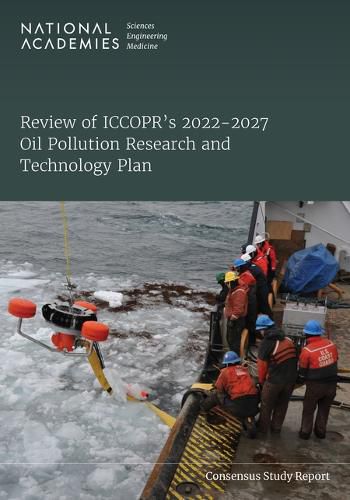Review of ICCOPR's 2022-2027 Oil Pollution Research and Technology Plan
National Academies of Sciences, Engineering, and Medicine, Division on Earth and Life Studies, Ocean Studies Board, Committee to Review the Interagency Coordinating Committee on Oil Pollution Research (ICCOPR) 2022-2027 Research and Technology Plan

Review of ICCOPR’s 2022-2027 Oil Pollution Research and Technology Plan
National Academies of Sciences, Engineering, and Medicine, Division on Earth and Life Studies, Ocean Studies Board, Committee to Review the Interagency Coordinating Committee on Oil Pollution Research (ICCOPR) 2022-2027 Research and Technology Plan
After the Exxon Valdez oil spill in 1989, advancing oil pollution research and technology to limit the environmental impacts of oil spills became a national and international priority. Congress responded by enacting the Oil Pollution Act of 1990 and forming the Interagency Coordinating Committee on Oil Pollution Research (ICCOPR) to coordinate research for preventing, planning for, responding to, and mitigating the effects of oil pollution on the environment. To achieve this end, ICCOPR published the oil pollution research and technology plan to guide research and funding priorities in 1992, with updates released over the years, most recently, the 2022-2027 Research and Technology Plan.
This new report provides advice and guidance on the approach, structure, adequacy, and implementation of ICCOPR 2022-2027 Research and Technology Plan. Coordinated research efforts are necessary so knowledge and capacity related to oil spill prevention, preparedness, response, mitigation, and restoration can be advanced. Future updates of the plan should utilize a more streamlined, transparent, and community-driven development process including development of an oil pollution research dashboard and inclusion of metrics to assess and communicate progress on oil pollution research priorities. ICCOPR should also initiate processes to allow for open-water field trials when appropriate. The report recommendations were developed to assist ICCOPR with developing a Research and Technology Plan that can be widely used to promote progress, coordination, and collaboration on priority oil pollution research needs within the United States and globally - research needs that are important for improving knowledge, capacity, and regulations to safeguard the environment.
Table of Contents
Front Matter Summary 1 Introduction 2 Evaluation of the R&T Plan Development Process 3 Evaluation of the R&T Plan Content 4 Implementation of the R&T Plan References Appendix: Committee Biographies
This item is not currently in-stock. It can be ordered online and is expected to ship in approx 4 weeks
Our stock data is updated periodically, and availability may change throughout the day for in-demand items. Please call the relevant shop for the most current stock information. Prices are subject to change without notice.
Sign in or become a Readings Member to add this title to a wishlist.


